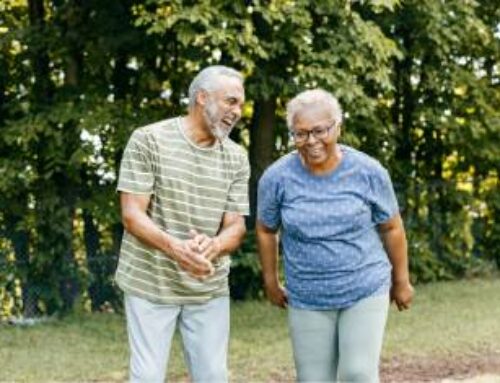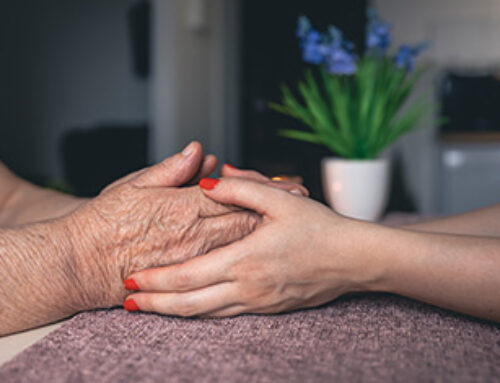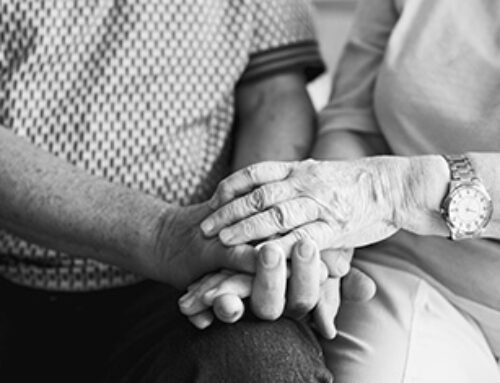How to Raise Awareness About Dementia in Hispanic/Latino Older Adults
Aging in Style: Health Topics among Hispanics/Latinos
Published January 2021 | Read this article in Spanish.
Imagine the following scenario: Your parent’s memory slips, and they briefly forget your name. You don’t think anything of it. A month later, they forget the birthday of their spouse of 50 years. Over time, these lapses in memory become more frequent. At 85 years old, your parent is diagnosed with dementia.
This is an all-too-common experience for people around the country, especially for Hispanic/Latino families. New and emerging research suggests that dementia is more common among Hispanic/Latino older adults.1 César J. Alvarado, a Program Specialist with the Alzheimer’s Association San Antonio & South Texas Chapter, shares: “some studies indicate older Hispanics/Latinos are about one and one-half times as likely to have Alzheimer’s or other dementia as older whites.” Other than old age, factors that put many Hispanics/Latinos at increased risk are poverty, heart disease, and other chronic diseases like high blood pressure and obesity.1 As the Hispanic/Latino population continues to grow in the US, the number with Alzheimer’s Disease is only expected to increase – from 379,000 in 2012 to an estimated 3.5 million in 2060!2
So, what’s the difference between Alzheimer’s Disease and dementia?
Dementia is the general word for a decline a person has in their mental ability that is severe enough to interfere with their everyday life, whereas Alzheimer’s Disease is a brain disease that is a form of dementia.3 Detecting and diagnosing dementia early is important because it gives families time to prepare. This means that raising awareness and increasing access to screening is essential to giving Hispanic/Latino older adults and their families the information they need to make informed decisions about their future.
“There is evidence that missed diagnoses of Alzheimer’s and other dementias are more common among older Black/African Americans and Hispanics/Latinos than among older whites.” – César J. Alvarado
How can we raise awareness about Alzheimer’s Disease and dementia among Hispanic/Latinos?
In Fall 2020, the Alzheimer’s Association held their annual Walk to End Alzheimer’s across the country. The purpose of these walks was to raise funds for programs, services and to increase awareness about Alzheimer’s and other Dementias. The San Antonio & South Texas Chapter hosted their first “Walk is Everywhere” (virtual) walk on November 7, 2020, in Harlingen, which is in the Rio Grande Valley of Texas. Due to COVID-19 and social distancing guidelines, the walk was done in a new, innovative way described as “Walk is Everywhere.” People participated in unique ways like walking on a treadmill or walking in their neighborhood while socially distancing. The participants used social media to tag their locations, connect with other walkers, and share their experiences. On November 14, 2020, another walk was hosted by the Alzheimer’s Association San Antonio and South Texas Chapter in McAllen, another major city in the Rio Grande Valley of Texas.
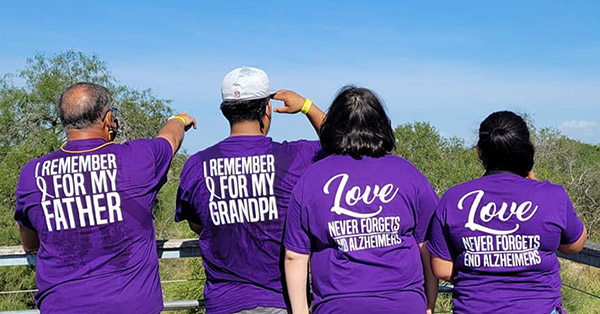
The San Antonio & South Texas Chapter hosted their first
“Walk is Everywhere” (virtual) walk on November 7, 2020.
What barriers do Hispanic/Latino older adults face when it comes to getting a dementia diagnosis?
Many Hispanics/Latinos choose to keep any concerns they may have about dementia quiet.4 Older adults may want to avoid being labeled as crazy (loco), and many see having a mental/memory disorder or illness as a weakness.5 Due to the mental health stigma, older adults may not seek help and individuals may avoid visiting their older family members if they are showing signs of Alzheimer’s or other Dementias prior to a correct diagnosis because they believe they are just ill (enfermos). However, this critical time is when family members should be close to their loved one, try to understand what is going on, and attempt to get them the help they need.
“There are myths regarding mental health. Some feel that they are forgetting things because of age. Alzheimer’s is not part of the normal aging process and we need to make sure people know that”. – César J. Alvarado
Additionally, research on dementia has historically been conducted with people of European descent leaving out Hispanics/Latinos.6 When Hispanics/Latinos are not included in research studies, risk factors that are specific to the various Hispanic populations are not discovered. Thankfully, in recent years, there have been improvements in the representation of diverse groups in research studies.
“Research is improving and being more inclusive.” – Cesar Alvarado
What about people who care for a loved one with Alzheimer’s Disease or dementia?
Although there are many ways to support caregivers, the Alzheimer’s Association San Antonio & South Texas Chapter developed a promise garden during their November walks which is made up of different color pinwheel flowers. The garden was designed to help family caregivers cope by providing a visual that shows them that they are not alone. Each color flower has a meaning: blue (I have Alzheimer’s), yellow (I am supporting or caring for someone with Alzheimer’s or dementia), purple (I have lost someone to Alzheimer’s or other Dementias), and orange (I support the cause and a vision of a world without Alzheimer’s).
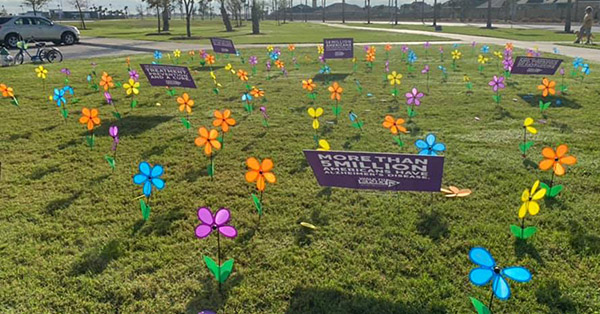
The Alzheimer’s Association also provides resources to family caregivers who look after their loved ones living with Alzheimer’s or other Dementias, including: assisting caregivers via a multilingual 24/7 helpline (800-272-3900) to provide support on a bad day or tips on caring for their loved one; hosting monthly support groups for caregivers to meet their needs through covering various topics and providing space for participants to share experiences and resources with each other; assisting caregivers with contacting clinicians that specialize in Dementia diagnoses; and finding additional local resources a caregiver might need.
“Loved ones are the ones reaching out, wives, husbands. Support is a need, there is a need for education.” – César J. Alvarado
Life after the passing of a loved one with Alzheimer’s or other Dementias is difficult but inevitable for caregivers. The death of a loved one with dementia can take an emotional toll on the caregiver due to the sudden change of losing the person they cared for daily. There are support groups, bereavement groups, and counseling services available. For resources, find your local Alzheimer’s Association chapter by visiting here and clicking “find resources in your community.” For additional caregiver support and resources in your area, visit the Family Caregiver Alliance website.
“I cared for my Father for over seventy hours per week during the last three-plus years of his battle with Alzheimer’s. It was the most difficult ‘job’ I have ever had, but it was also the most rewarding knowing Mom and I gave Dad high-quality care in his home with honor and respect.” – César J. Alvarado
Let’s talk about it and reduce the stigma!
Alzheimer’s Disease and other Dementias disproportionately affect Hispanic/Latino older adults. It is important to talk about these issues and help raise awareness in our Hispanic/Latino communities. Who knows? Maybe it will help someone seek a diagnosis and get treatment!
Free Technical Assistance for Service Providers and Individuals that Serve Hispanic Older Adults
Our Strengthening Aging Services for Hispanic Older Adults project is holding Virtual Technical Assistance calls to build the capacity of service providers and community members that address issues in the aging Hispanic communities, on the 3rd Wednesday of every month at 2 pm EST. Get information, tips, resources, and more from our experienced team! Reserve your spot now!
- https://www.nia.nih.gov/news/studies-explore-alzheimers-risk-factors-biomarkers-latinos#:~:text=The%20Centers%20for%20Disease%20Control,group%20in%20the%20United%20States
- https://www.usagainstalzheimers.org/sites/default/files/Latinos-and-AD_USC_UsA2-Impact-Report.pdf
- https://www.alz.org/alzheimers-dementia/difference-between-dementia-and-alzheimer-s
- https://consultqd.clevelandclinic.org/overcoming-mental-health-stigma-in-the-latino-community/
- https://www.assmca.pr.gov/BibliotecaVirtual/Salud%20Mental/Serving_DepressedElderlyLatinos.pdf
- https://www.eurekalert.org/pub_releases/2020-11/bawh-sdi110620.php
This project was supported, in part by grant number 90HDRC0004-01-00, from the U.S. Administration for Community Living, Department of Health and Human Services, Washington, D.C. 20201. Grantees undertaking projects under government sponsorship are encouraged to express freely their findings and conclusions. Points of view or opinions do not, therefore, necessarily represent official Administration for Community Living policy.
Blog Topics
About MHP Salud

MHP Salud has over 35 years of experience implementing CHW programs and training organizations looking to start and/or strengthen their own CHW programs. Visit our CHW Training & Consulting Services page to learn more about how we can help.

